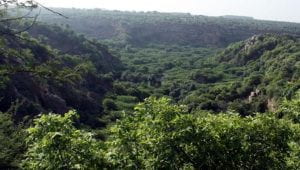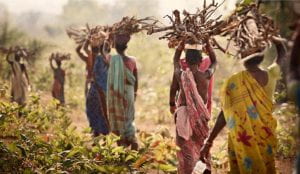Environmental degradation affects women in the global south in a number of ways. In these communities the responsibility of taking care of one’s family through collecting food, fuel, fodder and water is heavily placed on a woman’s shoulders. Through the destruction of the environment, women are having a harder and harder time collecting what is necessary to support their families. As the forest’s are taken over for commercial use and destroyed, as the waters are polluted and diverted to wells, as the community centers dissipate, so does a woman’s ability to provide adequately for her family (Agarwhal 128-129).
There are a great number of differences among ecofeminism coming from Western and non-Western viewpoints. While activists such as Karen Warren focus on the connections of the subjugation of women and the subjugation of nature to more symbolic ideas, activists such as Agarwhal and Shiva focus on the real damage that ecological destruction is wreaking on the communities of women living in the Global South. Warren’s Women-Nature connections allows a white-washed way to look at global destruction without taking into account the damage that is having an impact on women’s lives every day.
Ecofeminist discourse focuses on the historical and conceptual links between women and nature (Warren, Agarwhal 122, Hobgood-Oster 13), the common ground shared by the environmental movement as well as feminist movements (Agarwhal 122, Warren), and the vision of a future society (Agarwhal 122, Warren). What ecofeminist discourse from the Global North fails to note is “the underlying basis of women’s relationship with the nonhuman world at levels other than ideology” (Agarwhal 123). Basically what Agarwhal is saying here is that western feminist discourse tends to discount the real world effects of ecological destruction on women’s everyday lives, particularly women of the Global South.
Women who wake up every day and now must spend hours longer searching for ways to take care of their family than they did in the past (Agarwhal 138). Women who are no longer connected to their community who they used to be able to rely on in times of crisis (Agarwhal 141). With the destruction of their environment and the abandonment by their government for reasonable and applicable solutions, women have formed grassroots movements that focus on helping to find a solution to the crisis that these communities have found themselves in (Agarwhal 143, Shiva, Navdanya).
When I look at these different perspectives of ecofeminism, I find the whitewashed western way to be more interesting, more fun to learn about. Reading about Merchant’s observations and historical analysis makes me want to know more, makes me excited to learn about it; but, the perspective of the women of the Global South is eye opening. Growing up in rural Pennsylvania and living in poverty, I could never imagine living in the kind of poverty these women are facing. They have the unique advantage over white-washed feminism of having to actually act rather than provide discourse. If they don’t, they will slowly die, as will their communities. While I find western ecofeminism more interesting to learn about, I recognize the need for the ecofeminism of the Global South and recognize its importance in feminist discourse.
Works Cited




Hello Kiera,
the readings from last week mentioned symbolism a lot. This week, we got into real life issues. The symbolic aspect is important and very interesting, but it kind of creates a mental social movement and doesn’t really move us to make changes. This week, however, presented to us the real issues that women in third world countries are facing. This made me understand ecofeminism better because now I can actually see how women and nature are connected. Last week, I understood the reading, but I still didn’t quite understand how women were affected by the view of nature. When I read about the issue with water and with forests being destroyed, I understood that this put women at risk because women are mainly responsible for bringing food to the table. I also believe that emphasizing this creates more gender division because the issue with water and the destruction of nature affects everyone because men drink water and eat too. So why is this an issue of the woman? It’s an issue for everyone because we all need nature to survive. Women are more closely related to nature because we interact with it more, but are we really more at risk? I would say that we are equally at risk as everyone else.
I think that while men benefit from the women’s actions, women are still more at risk because they’re the ones on the ground actually doing the work whereas men aren’t the ones actually performing the actions despite the fact that they benefit nominally from said actions. It is the gendered division of labor that still exists, it is a different community than one we are used to, so the women’s labor is different from what we know, but taking care of the household still relies heavily on the shoulders of women the world over.
Test